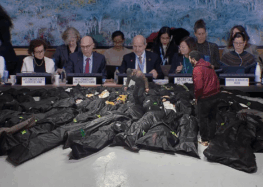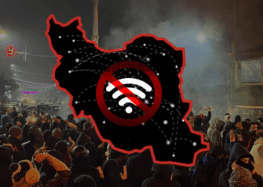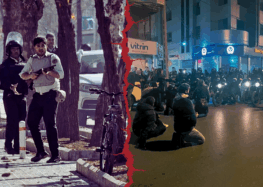Iran’s Shameful Performance Stuns the UN Human Rights Council
Duplicitous, Insincere Response Warrants Strong Condemnation in the March Session
(17 February 2010) As the review of Iran’s human rights record under the Universal Periodic Review (UPR) process concluded at the Human Rights Council in Geneva, the Iranian government demonstrated its utter lack of respect for internationally accepted norms by simultaneously accepting and rejecting recommendations of UN members with regard to addressing the critical situation of human rights in Iran, the International Campaign for Human Rights in Iran said today.
“This was a moment of truth, when the world could see the Iranian government’s deceitful attitude toward international human rights norms,” said Aaron Rhodes, a spokesman for the Campaign.
After the release of the draft report of the Working Group on the UPR of Iran, the Iranian government announced its acceptance of several key recommendations, while it rejected the same recommendations made by other states, causing much confusion about its true intent. During the brief procedural response, several member states, including the representatives of the United Kingdom, Brazil, France, Austria, and Australia expressed their bafflement at Iran’s rejections of recommendations that Iran considered “to be inconsistent with internationally recognized human rights.”
Iran rejected the following recommendations under the above justification:
- Rejected “To ensure that the new Penal Code safeguards the rights guaranteed by the International Covenant on Civil and Political Rights, to which Iran is a signatory, in particular by defining or removing offences open to political manipulation, such as so-called “offences against national and international security,” currently used to curtail freedom of expression, assembly, and association. Thus Iran explicitly admitted to political manipulation of these laws by its Judiciary.
- Rejected “To invite the Special Rapporteur on Torture to visit the country,” as well as, “To allow the Special Rapporteur on Torture to visit the country, and to provide him with access to detention facilities,” thereby admitting its unwillingness to account for ongoing torture and physical abuse at its prisons.
- Rejected “To repeal or amend all discriminatory provisions against women and girls in national legislation,” as well as, “To sign and ratify the Convention to End Discrimination and Violence against Women (CEDAW),” demonstrating its continued commitment to practice discrimination against women.
- Rejected “To immediately halt the execution of juveniles and political prisoners,” causing concerns that imminent and further executions following unfair trials will soon take place.
- Rejected “To take immediate action to cease the practice of torture in detention facilities, and to investigate and prosecute allegations of torture.”
- Rejected “To ensure the immediate release of illegally detained persons.”
- Rejected “To guarantee the independence of the judicial system, renounce the staging of collective trials and allow the effective exercise of the right to defense.”
- Rejected “To end its sever restrictions on the rights to free expression association and assembly; and to end the harassment and prosecution of journalists and bloggers.”
- Rejected “To prosecute security officials involved in torturing, raping, or killing.”
Ironically, among the recommendations accepted by Iran are several substantially the same as those, which were rejected. This simultaneous act of taking contradictory positions on the same issues demonstrates the Iranian government’s lack of respect for international bodies and mechanisms, and for the essential rational-legal processes of the international community.
“The Iranian government is loudly telling the world that it cannot be trusted in international negotiations and interactions, has no ability to demonstrate sincere intentions to cooperate, and instead reveals contempt for the international community,” Rhodes said.






